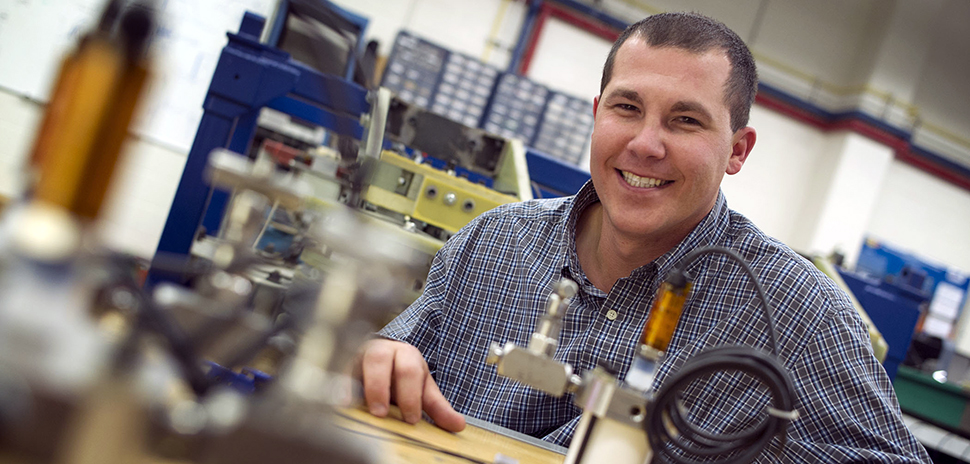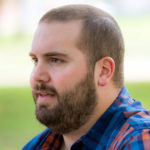![]() Every week, we pore through press releases and websites doing a little research of our own. We’re looking for scientists, professors, engineers, entrepreneurs—anybody, really—engaging in research and development across North Texas.
Every week, we pore through press releases and websites doing a little research of our own. We’re looking for scientists, professors, engineers, entrepreneurs—anybody, really—engaging in research and development across North Texas.
There’s plenty of good work being done. If you want to put R&D under your microscope, sign up for our e-newsletter.
$1M in NSF grants back work to ward off ‘malicious insiders’

Hassan Takabi, director of the University of North Texas. [Photosby Michael Clements via UNT]
Hassan Takabi, an assistant professor in the University of North Texas’ College of Engineering has received more than $1 million in grants from the National Science Foundation to take on “malicious insiders” doing things they shouldn’t be doing in a computer system to which they have regular access.
According to a release, the first grant is for $515,974 and will go toward development of a computer defense against malicious insiders who leverage basic computer access into unauthorized computer entry.
“If a person from inside a system tries to access data they shouldn’t, we are going to put false paths and fake information in their way.”
Hassan Takabi
“If a person from inside a system tries to access data they shouldn’t, we are going to put false paths and fake information in their way,” Takabi said.
UNT said that Takabi is designing his system to supplement access control systems. It won’t just lead malicious users to fake files; it will also allow them to be traced to their point of origin, where insider threats can be identified and access restricted.
The second grant, for $499,581, will be used to develop a set of instructional modules and hands-on lab exercises that UNT said will merge the study of data science and analytics with cybersecurity.

David Wetz [Photo Courtesy the University of Texas at Arlington]
UTA, Naval Surface Warfare Center sign Education Partnership Agreement
A formal Education Partnership Agreement signed recently between The University of Texas at Arlington and the Naval Surface Warfare Center Philadelphia will enhance research and education at the university through interactions with NSWCPD personnel and sharing scientific, engineering, and technological assets, UTA said in a release.
It’s the first agreement with a university outside the Philadelphia area for NSWCP, and it’s more than just sharing assets.
UTA said that NSWCPD researchers can involve faculty and students from UTA in U.S. Navy research projects, loan equipment to the university for educational purposes, and, perhaps, develop and teach science and engineering courses at the university.
The agreement came to fruition in part because of ongoing collaborative research projects underway since 2011 with David Wetz, a professor in UTA’s Department of Electrical Engineering who specializes in energy storage and pulsed power system design. UTA said he’s conducted extensive research about battery power and other shipboard energy needs.
The university said that Wetz and NSWCPD engineer John Heinzel already have started expanding power and energy research at UTA by creating a multidisciplinary team to address the technical challenges in that arena.
UNTHSC research looks at traumatic brain injuries’ effects on veterans

Vicki Nejtek

R.J. Hillman
Back in the University of North Texas System, a scientist at the University of North Texas Health Science Center in Fort Worth is doing research on military veterans whose past brain injuries could put them at increased risk for neurodegenerative diseases such as Parkinson’s and Alzheimer’s diseases, as well as premature cognitive decline.
Vicki Nejtek, Ph.D., an associate professor in the Institute for Healthy Aging, and Pharmacology, and Neuroscience at UNTHSC, is looking into the growing evidence that even a mild traumatic brain injury can increase those risk for ex-military.
“Some people may not even realize the extent of their injury or what has happened to them until much later.”
Vicki Nejtek
According to UNTHSC, roughly 1.5 million individuals sustain some type of traumatic brain injury, and about 75 percent of those are classified as a mild TBI. For combat veterans, such things as an IED explosion can trigger loud sound waves and those people typically feel dazed.
Once they return to their activities, symptoms could go unrecognized and undiagnosed, the center said in a release.
“This is not always a direct blow to the head,” she said. “Some people may not even realize the extent of their injury or what has happened to them until much later.”
As an example, UNTHSC writer Jan Jarvis tells about the effects an IED blast had on Army veteran R.J. Hillman, who has exhibited symptoms of lasting effects from the explosion. Find out his story and more about Nejtek’s research here.
READ NEXT
R&D: Novel Stroke Therapy Called Leap Forward, Scientists Will Tackle Aging at Conference
You’ll also learn the science behind how a trip to a haunted house at Halloween might improve your romantic life. Here are some of the research projects underway in North Texas that could make lives better.
![]()


































































